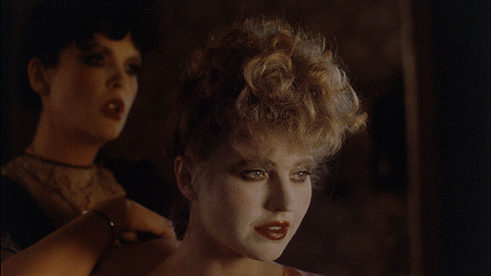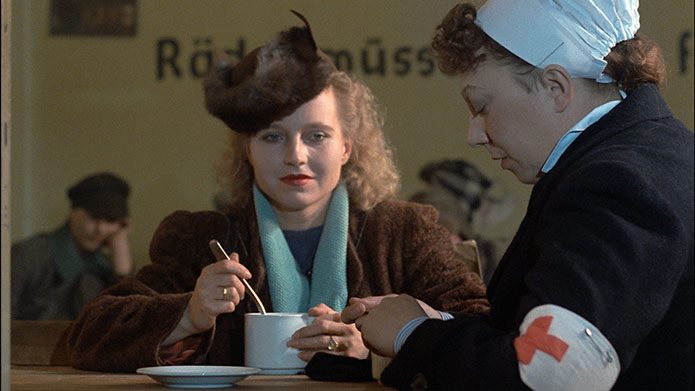QAGOMA Retrospective
The Marriage of Maria Braun: Starting and ending with a bang

Rainer Werner Fassbinder’s iconic film ‘The Marriage of Maria Braun’ is a feature of desire and futility, of resourcefulness and inevitability, and of honestly assessing a plethora of contradictions on a human and societal level. It screens as part of the Rainer Werner Fassbinder retrospective at the QAGOMA in Brisbane.
The Second World War rages through Berlin as Maria (Hanna Schygulla) marries soldier Hermann Braun (Klaus Löwitsch). They steal a moment amidst the bombing — and amidst Hermann’s military service — to become husband and wife, but it’s debris rather than confetti that rains down on their union. A foreboding event, to be certain, the ceremony starts their relationship as it will continue. For the decade after the couple’s initial “half a day and a whole night” together, as Maria later describes their first throes wedded bliss, life’s detritus clutters their romance.
Still, it’s their happy occasion that commences The Marriage of Maria Braun — for what is Rainer Werner Fassbinder’s iconic feature without its nuptials, or without its eponymous character adopting her married moniker? The director stages their wedding like a catastrophic comedy: a hole is blown through the registry wall, sending a sober-looking portrait flying from its hangings, while Maria and Hermann dive to the ground before finishing the requisite formalities. Cutting yet comic and dramatic yet moving, as the entire movie proves, Fassbinder doesn’t shy away from the scene’s amusement, emotions or underlying statement. Made at any time by a filmmaker reportedly opposed to matrimony, the feature’s opening says much about marriage’s contradictions; about an institution that claims permanence but is all-too-easily rattled. Made during Germany’s recovery from the war and set in the combat’s immediate aftermath, however, the film directs its fiercest commentary towards a nation clinging to past perceptions that are constantly crumbling, and to a population idolising its history while doing whatever it takes to secure its future.
“BOOKS BURN TOO FAST; THEY DON’T GIVE ANY HEAT.”
From Maria and Hermann’s 1943 ceremony, the film jumps to the former in concerned, lovelorn mode in the wake of the latter’s prolonged absence. It’s 1946 and the war has ended, but Hermann has not come home. Despite Maria’s dedicated search, visiting railway stations wearing a cardboard sign with his photograph, he’s missing in action and presumed dead. So after a friend, Willi (Gottfried John) returns from the front with the news she doesn’t want to hear, she parlays her job in an American-frequented bar into an affair with US solider Bill (George Byrd). As well as keeping her in stockings and cigarettes, theirs is an easy, undemanding affection, the two lonely souls finding company in each other — but when Hermann re-emerges, Maria’s new romance comes to an end with a fatal bottle blow.The above might comprise an entire feature for some, though not for Fassbinder or the film’s two credited writers: Pea Fröhlich and Peter Märthesheimer, who would also script the director’s subsequent BRD Trilogy titles, 1981’s Lola and 1982’s Veronika Voss, about women living in West Germany post-WWII. Indeed, The Marriage of Maria Braun is just getting started, as Hermann takes the blame for Bill’s death and heads to prison, once again leaving Maria behind. Then, after talking her way into the first-class carriage, she meets manufacturer Karl Oswald (Ivan Desny) during a train ride, securing a job and a new lover by the end of their journey. Maria takes to their relationship with the same pragmatism and practicality applied to everything except her marriage to Hermann, valuing the cunning and concrete in the name of survival. In fact, early in the feature, when she is spied buying a dress for work from a illicit merchant (played by Fassbinder himself), Maria sums up her opportunistic philosophy perfectly; offered a rare collection of German poet Heinrich von Kleist’s work, she declines the purchase, advising “books burn too fast; they don’t give any heat.”
“AT LEAST IF YOU KNOW YOU’RE UNHAPPY, THERE’S STILL HOPE.”
Determined not only to endure and succeed, but to build a prosperous foundation for her eventual reunion with Hermann, Maria gives plenty of heat. Oozing charm and inhabited by 20-time Fassbinder veteran Schygulla as if she was re-enacting a past life rather than merely playing a fictional part, the movie finds its soul and purpose not only in its titular character, but in the performance that goes with it. How better to explore the unfettered reality of striving towards Germany’s capitalism-driven post-war economic miracle than to look into the eyes of a woman living and breathing its ethos? How better to chart its hits and misses than to see the toll taken, for better and for worse, on someone dedicated to rekindle a time when she was happiest by any means necessary, however fleeting it might’ve been? Like the work of Douglas Sirk, whose pointed melodramas Fassbinder so admired, as much is conveyed in Schygulla piercing gaze, confident posture and calculating energy as in the barbed lines that the film has Maria speak.The Marriage of Maria Braun is a feature of desire and futility, of resourcefulness and inevitability, and of honestly assessing a plethora of contradictions on a human and societal level. It’s about a heroine who’ll do anything to thrive, possesses no qualms about her actions and isn’t willing to hide her true nature — as she puts it, “at least if you know you’re unhappy, there’s still hope” — but is still forced to navigate her way through a broader situation that isn’t of her own making. In his last lensing job for Fassbinder, Michael Ballhaus’ cinematography gifts the movie with images that are fluid, warmly lit yet unmistakably marked by life’s messiness, and couldn’t encapsulate the film better. When it starts as it ends, aka with a bang, so does a clear-eyed look at life after wartime. With Fassbinder passing away just four years and seven films later, The Marriage of Maria Braun helps bring his prolific career to a close in the same fashion.
